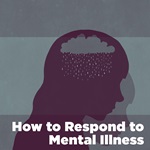Every effective small-group leader knows the importance of creating a safe environment where members can speak freely. This involves discussing the expectations of the group and laying out ground rules. Plus, great leaders model authenticity by sharing themselves.
Being able to speak freely simply isn't all that common. As I travel across the country and speak to groups, I'm constantly reminded of how people are looking for permission to be honest about their struggles. Too often we create Christian communities that are so concerned about looking good, we completely miss opportunities to truly connect for the kingdom. People connect when they're real and transparent about their struggles, doubts, and issues.
My struggles started in college. At first, life was pretty carefree. It was about happy hour and designer jeans, with a little bit of studying thrown in when necessary. My life changed abruptly, however, the moment I had my first panic attack. I was suddenly filled with fear and wondered where God was hiding. Doctors and counselors were of little help as they tried to identify the source of my trouble.
As my doubts grew and the doctors struggled to find answers, I began to do my own research, replacing happy hour with time spent in books on philosophy, history, and religion. I pored through medical journals and studied the merits of psychology, all in a manic search for answers.
It would be more than a decade before a heart condition would be diagnosed and treated—a condition that released uncontrolled adrenaline into my system and fueled my panic attacks. I remember the relief I felt on the day of my diagnosis. On the other hand, it was unsettling when my life was reduced to two words on his notepad: panic disorder.
In my embarrassment, I did my best to keep my struggle private. These days, though, quite the opposite is true. Nothing about my struggle was easy, but in the sovereign hand of God, it all became very useful. It became the impetus for my learning and ultimately the source of my teaching today. I've become a strong advocate for what it means to come clean about our struggles, particularly among fellow believers.
As a small-group leader, you can help. Anxiety disorders are incredibly common, with over 18 percent of American adults affected—42 million people in all. With these statistics, it's likely that some of your group members are struggling. By creating a safe environment, understanding anxiety disorders, and helping group members get the help they need, you can help break down the stigma around mental health issues in the church.
Understand Anxiety
Anxiety disorders can have both spiritual and emotional components. Examining our walk with God is essential. Investigating the environment from which we've originated and the circumstances in which we currently live is also crucial.
But more often than not, mental problems flourish for physical reasons. There are a plethora of physical causes to panic disorder, including genetic predispositions, unhealthy brain function, and head trauma. Hyperthyroidism and hypoglycemia have also been linked to adrenaline problems that can cause acute anxiety. Medicine withdrawal is also a major contributor, as is the use of stimulants including amphetamines, cocaine, and caffeine.
Many people who struggle with serious depression are surprised to discover its strong physiological links. But, as Dr. Matthew Stanford writes, most cases of clinical depression are shown to be the direct result of chemical imbalances, which is why so many of them respond well to medication. Chemicals that carry signals to the brain—or neurotransmitters—can become out of balance as the result of illness, stress, trauma, or even genetics.
How to Help
As small-group leaders, we can encourage those who struggle with anxiety to take a holistic approach to their health: spiritual, physical, and mental. First on a spiritual level, we need to encourage them to spend time with God in prayer and in Bible study, both alone and in the presence of those who will support them. On a physical level, we can encourage lifestyle choices that maximize physical and emotional health through diet and exercise and simply avoiding situations that drain us of energy and joy. Finally on a mental level, we need to encourage visits to qualified counselors, psychologists, psychiatrists, and pastors.
All three of these approaches were crucial on my own journey, and the medication I received from a psychiatrist played a major role. It was the missing link to my personal equation and may just be the answer for someone else. The idea of taking medication, however, is a problem for some people.
Traditionally, there has been stigma attached to taking medicine, which undoubtedly originated in ignorance. It's extremely difficult to explain to someone who has never had acute anxiety, clinical depression, or an addiction just how out of control these struggles can be. But the brain is an organ, like a kidney, that can get sick. Diabetics take insulin. Nearsighted people wear glasses. People with faulty brain chemistry—whether it results in anxiety, depression, or other conditions—can benefit from medicine, too.
When we are unwilling to acknowledge that we are created mind, body, and spirit, and that one inevitably catches the ills of the others, we miss crucial opportunities to offer help to people who are struggling. This is unfortunately particularly true in the church.
One night, at a conference, I finished speaking and was heading back to my cabin when a woman lingering in the shadows approached me. When she was sure no one could hear, she told me she'd been suffering from anxiety and depression. The depression got so bad that sometimes she couldn't function in her job, talk to other people, or even get out of bed. She was despairing over her loss of interest in her kids, life, and God.
To learn more, I asked if she'd seen a doctor. She told me that she had and was diagnosed with clinical depression and put on medication. The medicine had worked well, but a woman in her prayer group told her that if she simply had more faith, she wouldn't need the medicine. Believing she was dishonoring God, this woman had gone off her medication. Now this worn-out shell of a woman stood before me in the shadows with faith that was hanging by a thread.
I offered two pieces of advice. First, I told her she needed to go back to her doctor to talk about getting back on medication. I once heard Chuck Swindoll say on the radio, "Don't ask me to pray for your healing if you're not following your doctor's instructions." Taken out of context, this statement makes Swindoll sound like he doesn't believe in prayer or healing, but I happen to know he believes in both. He also believes, however, in using the resources at our disposal.
Second, I told her to consider finding a new prayer group, at least until she was healthy enough to discuss these issues on equal footing. When we're in the thick of struggle, we need people supporting us and helping us find resources, not telling us we don't have enough faith. In the midst of struggle, this woman was unable to push back on this group's unhelpful advice.
Three years later, I ran into the same woman, though I didn't recognize her anymore. Nothing about her looked the same. She was strong and rested, and she was back in ministry, happily firing on all cylinders.
How can we help a member of our small group who is struggling with an anxiety disorder? First we listen and give them permission to voice their pain, disillusionment, and doubt. When we drop the stigma and cultivate a safe environment where honesty is welcome, we earn the right to offer genuine support and advice. Then we can follow up with a phone call, offer suggestions for counselors, and check in on their progress.
We also need to encourage those who are struggling with mental problems to embrace a holistic approach that looks at the mind, body, and spirit. Scripture offers many examples of people who struggled with various types of illnesses, and we're instructed to bind up the wounds of the afflicted. The wounds of those struggling with anxiety disorders, although harder to see, are nonetheless present and debilitating. As small-group leaders, we can help our group members by helping them create a holistic plan for healing and growth.
—Ann Sullivan is author of Permission to Doubt: One Woman's Journey into a Thinking Faith.













